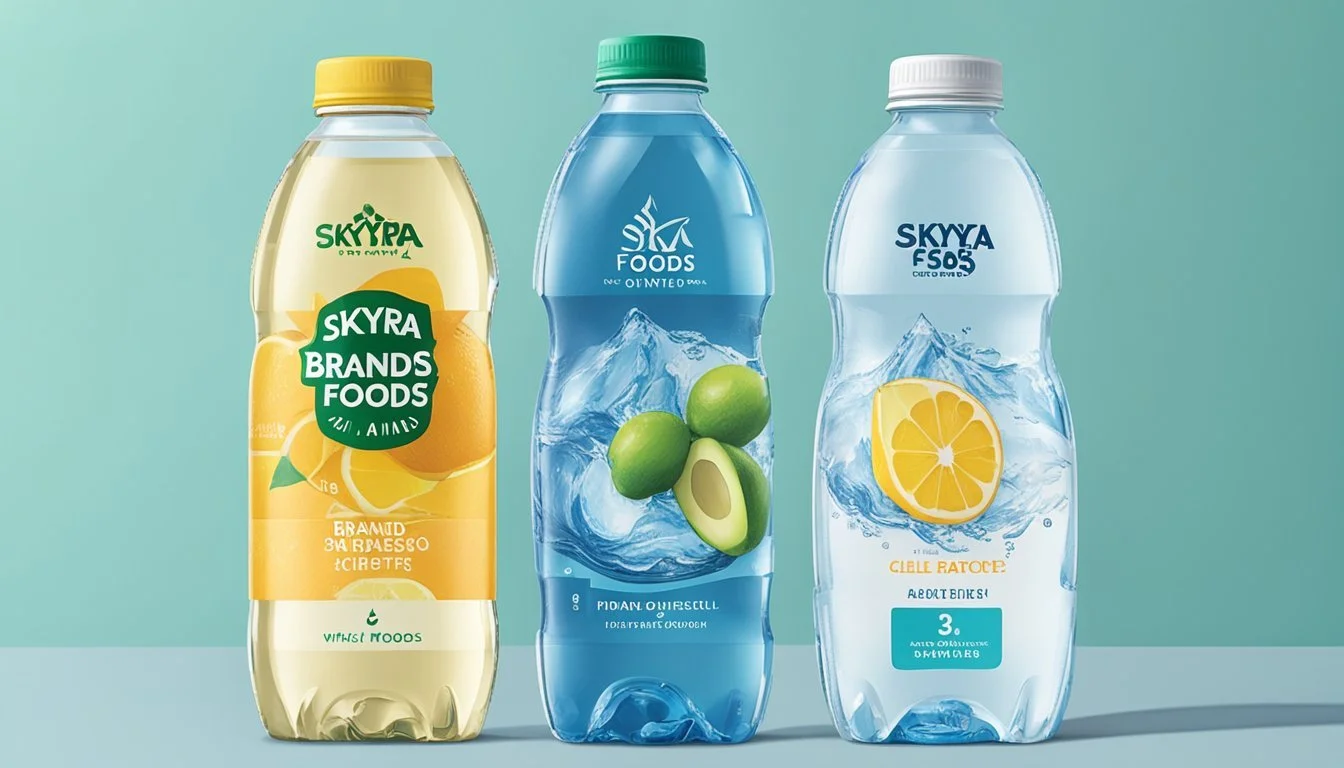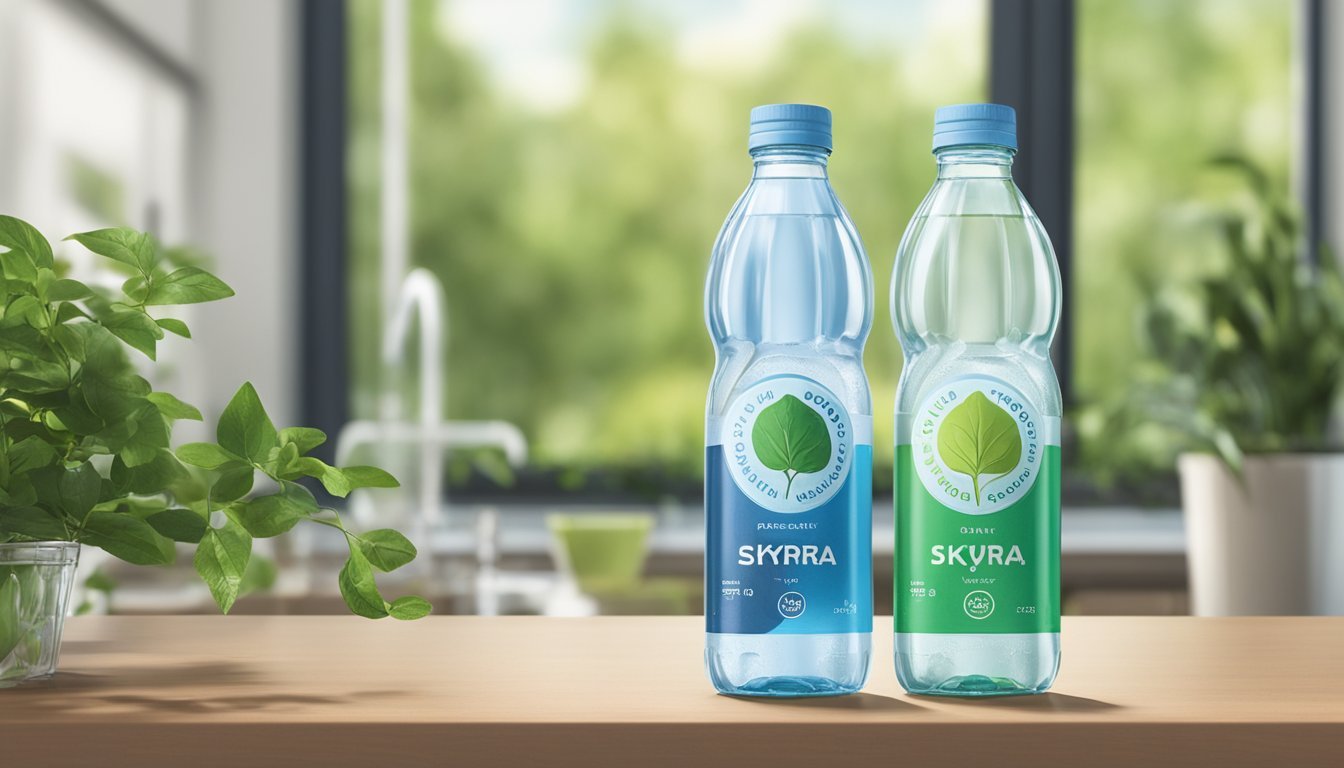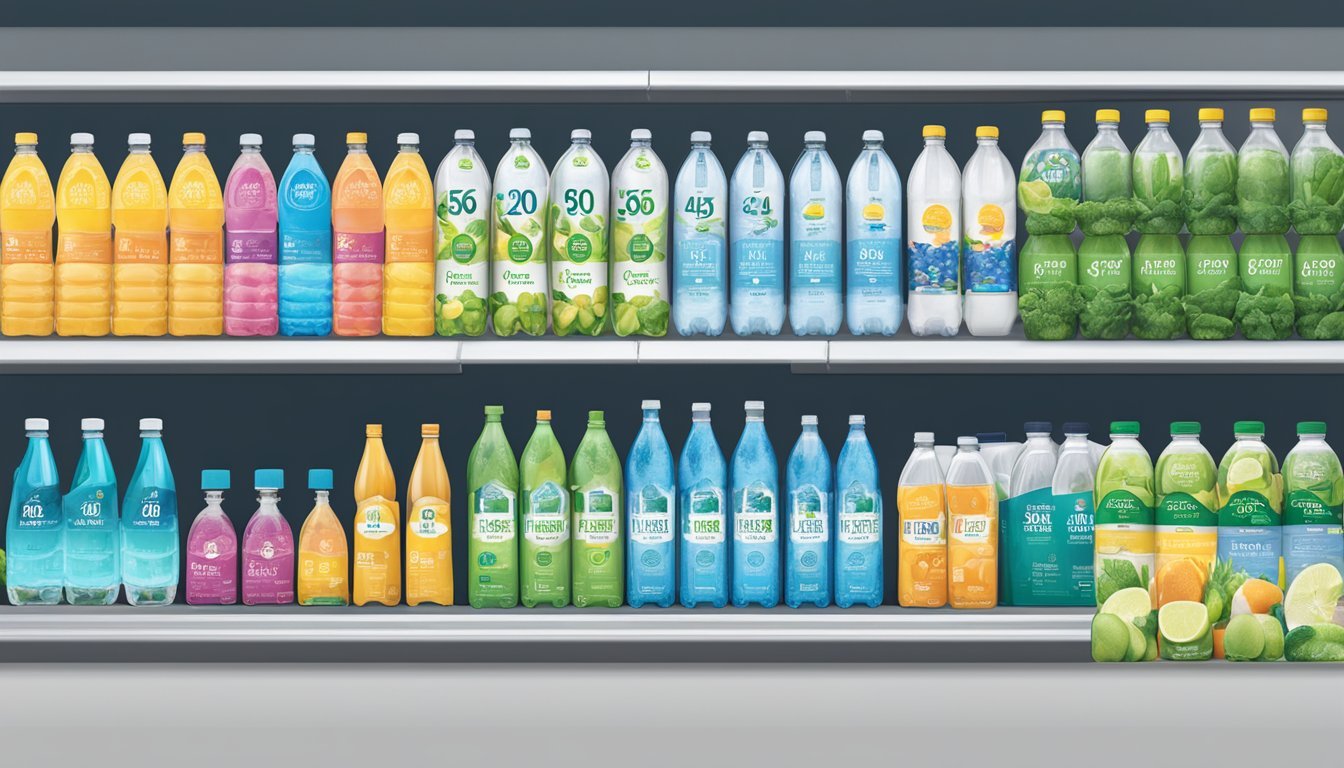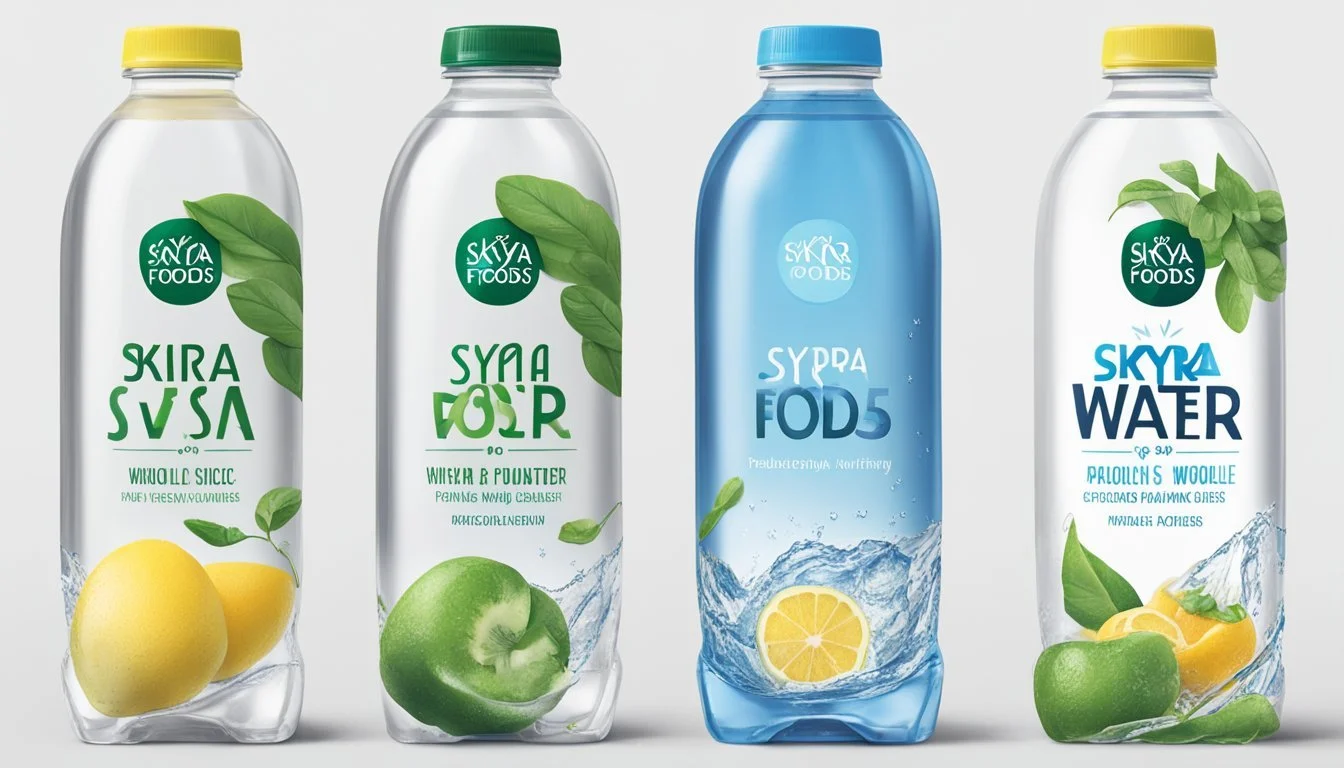Skyra vs. Whole Foods 365
Which Bottled Water is Better for You?
Skyra and Whole Foods 365 are two popular bottled water brands that offer unique hydration benefits. Skyra, sourced from Icelandic spring water, boasts a naturally high pH of 8.88 due to its filtration through basalt and lava. This gives it a refreshing and clean taste that many consumers appreciate.
Whole Foods 365 bottled water, on the other hand, is known for being a cost-effective and widely available option. It provides clean and safe drinking water that meets the quality standards consumers expect from the Whole Foods brand. When comparing the two, many find that Skyra's mineral-rich composition and crisp taste can be worth the higher price point due to its unique sourcing and natural filtration process.
Both brands emphasize providing clean, portable hydration, but they cater to different consumer needs and preferences. Readers can make an informed decision based on whether they value the specific qualities of Skyra's spring water or the accessibility and reliability of Whole Foods 365.
Examining the Brands
Skyra and Whole Foods 365 distinguish themselves through their unique characteristics and market positioning. A closer look at each brand reveals key features that set them apart in the competitive bottled water industry.
Brand Overview: Skyra
Skyra is known for its high pH level and electrolyte content, making it a popular choice among health-conscious consumers. Sourced from natural springs in Iceland, Skyra water boasts a high mineral content that contributes to its crisp, refreshing taste.
Its packaging often highlights the water's purity and the pristine nature of its Icelandic source, appealing to those who prioritize natural products. Skyra's focus on quality is underscored by its rigorous testing protocols to ensure consistency and safety.
Skyra is not as widely available in grocery stores as other brands, which can make it less accessible for some consumers. However, its presence in upscale and specialty markets speaks to its premium positioning.
Brand Overview: Whole Foods 365
Whole Foods 365 is the house brand of Whole Foods Market, designed to offer affordable yet quality products. This spring water is sourced from various natural springs and is positioned as a budget-friendly alternative in the bottled water segment.
Though some consumers find its taste similar to purified water, others appreciate its accessibility and affordability, often sold at competitive prices. Whole Foods Market's commitment to quality and sustainability is reflected in the 365 brand, with environmentally conscious packaging and transparent sourcing practices.
Whole Foods 365 water is readily available across many Whole Foods Market locations, making it a convenient option for shoppers. Its extensive presence and strong brand association with Whole Foods enhance its appeal to regular customers looking for reliability at a lower price point.
Source and Origin
Skyra and Whole Foods 365 both source their waters from unique origins, each with its specifics on purity and quality.
Skyra's Natural Spring Sources
Skyra water is bottled in Iceland. It originates from pristine natural Icelandic springs, filtered over time through layers of basalt and lava. This natural filtration results in water with a naturally high pH of 8.88, making it alkaline.
This water is sourced from self-replenishing springs, ensuring sustainability. Skyra emphasizes its untouched nature, with nothing added or removed. This ensures that consumers receive pure water. Skyra's Icelandic origin also implies a reliance on clean, unpolluted groundwater, contributing to its high-quality characteristics.
Whole Foods 365 Sourcing Practices
Whole Foods 365 sources its spring water from various locations. One notable source is New Zealand, specifically from ancient artesian springs. This diverse sourcing strategy enables Whole Foods to offer a variety of water types, including alkaline and electrolyte-infused options.
Their spring water undergoes rigorous quality control to maintain purity standards. The diverse sourcing ensures that the natural minerals and taste of the water are preserved. Spring water from these sources indicates that the company seeks high-quality, natural water sources for its products.
The geographically varied origins of Whole Foods 365 waters contribute to its versatility and availability, reflecting a commitment to providing customers with a range of high-quality bottled waters.
Water Quality and Purity
Skyra and Whole Foods 365 offer distinct advantages when it comes to water quality and purity. This section will delve into the mineral content, pH levels, and filtration methods used by each brand to ensure clean and safe drinking water.
Analyzing Mineral Content and Purity
Skyra water is sourced from Iceland and is known for its high mineral content. It includes essential minerals such as magnesium, calcium, and silica. These minerals not only contribute to taste but also provide health benefits.
Whole Foods 365, on the other hand, offers both spring and purified water options. The mineral content in their spring water varies based on the source but tends to be less concentrated than Skyra’s. Their purified water undergoes a rigorous filtration process to remove impurities, ensuring a clean and consistent taste.
For those interested in the specific mineral content, Skyra often lists detailed information on their labels, whereas Whole Foods 365 provides a more general overview. This can make Skyra a preferred choice for those seeking specific mineral benefits.
Understanding pH Levels and Balance
The pH level of bottled water can significantly affect its taste and potential health benefits. Skyra water typically has a pH ranging from 7.6 to 8.4, making it slightly alkaline. Alkaline water is believed by some to offer health benefits, such as better hydration and acid neutralization in the body.
Whole Foods 365 water varies in pH. Their spring water typically has a neutral to slightly alkaline pH, similar to natural spring sources. The purified water, after undergoing various filtration methods, usually achieves a neutral pH around 7.
While both brands provide safe pH levels for consumption, Skyra’s naturally alkaline profile could be more appealing to those specifically looking for slightly alkaline water.
Contaminant Standards and Filtration Methods
Ensuring the absence of contaminants is crucial for bottled water quality. Skyra boasts strict adherence to European Water Quality standards, testing for contaminants like lead and arsenic. Their natural filtration through volcanic rock adds an extra layer of purity.
Whole Foods 365 utilizes advanced filtration processes, including reverse osmosis for their purified water. This process effectively removes contaminants such as PFAS chemicals, lead, and other impurities. Their spring water also undergoes rigorous testing to meet EPA standards, ensuring it’s free from harmful substances.
Both brands emphasize high filtration standards and regularly test for common contaminants, assuring consumers of clean drinking water. Skyra’s natural filtration and adherence to stringent European standards offer a unique selling point, while Whole Foods 365's use of modern techniques like reverse osmosis provides a robust solution against contaminants.
Taste Profile
Skyra and Whole Foods 365 are both mineral-rich bottled waters, yet they offer distinct taste experiences. A closer look at their flavor profiles and insights from water sommeliers underscores the key differences and features of each.
Flavor Comparison
Skyra, an alkaline water, boasts a high pH level which lends it a subtly sweet and smooth taste. The presence of natural electrolytes enhances its flavor, providing a refreshing and crisp experience. This characteristic makes Skyra particularly appealing for those who prefer a more neutral and hydrating taste.
Whole Foods 365, by contrast, is a spring water that has a simpler, more straightforward taste. Some drinkers find it has a slightly dry aftertaste, making it less appealing compared to other premium options. Despite its clean taste, it lacks the nuanced flavors that accompany mineral-rich waters like Skyra.
Water Sommelier Insights
Water sommeliers note that Skyra's unique composition, including its alkaline properties and mineral content, contributes to its distinct smoothness and mild sweetness. These elements not only enhance the drinking experience but also make Skyra a versatile option for pairing with meals.
On the other hand, Whole Foods 365 has been described by sommeliers as reliable yet unremarkable. It serves well as a basic hydration option without offering distinctive taste qualities. While its affordability and accessibility are strong points, it does not stand out in taste tests when compared to more premium bottled waters.
Health and Hydration Benefits
Skyra and Whole Foods 365 bottled waters both claim to offer health and hydration advantages. Each brand differentiates itself through the unique blend of electrolytes and minerals they provide, contributing to overall wellness and hydration.
Electrolytes and Minerals for Wellness
Skyra water boasts 84 added minerals, including essential ones like calcium, potassium, and magnesium. These minerals support crucial bodily functions, such as muscle contraction and nerve transmission, and improve overall hydration.
Whole Foods 365 water, on the other hand, focuses more on basic hydration needs. It offers a standard profile of electrolytes but doesn't include the high mineral content found in Skyra. While it may not have the extra boost of essential minerals, it still provides adequate hydration.
A comparison of the mineral content shows a clear distinction between the two brands. Skyra's enhanced mineral composition might be more appealing to those looking for additional health benefits from their water.
For consumers prioritizing comprehensive wellness, Skyra's enriched mineral profile potentially makes it a stronger choice. Conversely, Whole Foods 365 provides a reliable and straightforward hydration option.
Packaging and Sustainability
Evaluating the packaging and sustainability of Skyra and Whole Foods 365 reveals significant differences in their approaches to environmentally friendly practices and materials.
Bottle Materials and Environmental Impact
Skyra opts for eco-friendly packaging by using 100% recycled PET bottles, aiming to minimize plastic waste. This material reduces the need for virgin plastic, thereby contributing to lower carbon emissions.
Whole Foods 365, on the other hand, predominantly uses plastic bottles. Though they emphasize affordability, the environmental benefits are comparatively less notable. Plastic has a longer degradation time and a higher environmental footprint.
Skyra's recycled material initiative positions it better for sustainability-conscious consumers. Emphasizing recyclability and the reduction of plastic pollution could influence market preferences significantly.
Brand Commitments to Sustainability
Skyra emphasizes its commitment to sustainability through various initiatives. These include reducing carbon emissions and promoting the circular economy. By focusing on reused materials in their bottles, they reduce overall environmental impact.
Whole Foods 365, while providing cost-effective options, lacks substantial sustainability initiatives relative to Skyra. They need more significant efforts towards implementing sustainable practices in packaging.
Consumers seeking eco-friendly options might find Skyra’s efforts more appealing. The focus on sustainability initiatives is crucial for modern consumers increasingly concerned about their environmental footprint.
Consumer Convenience and Accessibility
Skyra and Whole Foods 365 are both popular options in the bottled water market, each catering to different consumer needs. Factors such as retail availability, price points, packaging options, and sizes significantly influence their convenience and accessibility.
Retail Availability and Price Point
Skyra water can be found in a variety of retail environments, including major grocery stores, convenience stores, and some specialty shops. It tends to be priced at a premium due to its source and branding. The average cost of a 1-liter bottle is around $1.50-$2.50, making it a more luxurious choice for consumers seeking high-quality water.
Whole Foods 365 brand bottles are primarily available at Whole Foods Market locations. This can limit accessibility for consumers who do not have a nearby store. However, the pricing is more competitive, with a 1-liter bottle typically costing $0.99-$1.50. This affordability can make it an attractive option for regular purchase by budget-conscious shoppers.
Packaging Options and Sizes
Skyra offers a range of packaging options, including 500ml, 1-liter, and 1.5-liter bottles. The sleek design and variety of sizes cater to different situations, whether for on-the-go hydration or during longer activities. Their packaging is often regarded as eco-friendly, which appeals to environmentally conscious consumers.
Whole Foods 365 also provides a variety of bottle sizes, generally including 500ml and 1-liter options. Their packaging is straightforward and functional, designed to meet the everyday needs of consumers. While they may not have as many size options as Skyra, their availability of popular sizes ensures they meet the essential demands of most shoppers.
By evaluating these aspects, consumers can better decide which brand aligns with their personal convenience and accessibility needs.
Comparative Analysis Conclusion
Skyra and Whole Foods 365 offer unique qualities that cater to different preferences and needs.
Skyra distinguishes itself with a high pH level and notable electrolyte content. These attributes contribute to its reputation as a high-quality water option for those seeking enhanced hydration benefits.
Whole Foods 365 provides a cost-effective alternative without compromising natural water quality. It is sourced from natural springs and boasts a taste profile reminiscent of purified waters.
Taste:
Skyra: Slightly alkaline with a smooth finish.
Whole Foods 365: Neutral pH around 8.0, often compared to purified waters.
Price points differ, with Whole Foods 365 being more accessible due to its lower cost. This makes it an attractive choice for budget-conscious consumers.
Source:
Skyra: Naturally sourced with a focus on high mineral content.
Whole Foods 365: Spring water that maintains a natural profile.
Quality and Report information indicate both are reliable options with distinct benefits. Consumers can confidently choose based on their specific hydration needs and taste preferences.
More About Skyra
Mountain Valley Spring Water vs Skyra: Which Bottled Water is Better?
Richard's Rainwater vs Skyra: Which Bottled Water is Better?
Whole Foods Italian Still Mineral water vs Skyra: Which Bottled Water is Better?
More About Whole Foods 365
Acqua Pana vs Whole Foods 365: Which Bottled Water is Better?
Alkaline88 vs Whole Foods 365: Which Bottled Water is Better?
Antipodes vs Whole Foods 365: Which Bottled Water is Better?
Aqua Carpatica vs Whole Foods 365: Which Bottled Water is Better?
Arrowhead vs Whole Foods 365: Which Bottled Water is Better?
Big Chill vs Whole Foods 365: Which Bottled Water is Better?
Boxed Water vs Whole Foods 365: Which Bottled Water is Better?
Cascade Mountain vs Whole Foods 365: Which Bottled Water is Better?
Castle Rock vs Whole Foods 365: Which Bottled Water is Better?
Core Hydration vs Whole Foods 365: Which Bottled Water is Better?
Crystal Geyser vs Whole Foods 365: Which Bottled Water is Better?
Deer Park vs Whole Foods 365: Which Bottled Water is Better?
Hawaii Volcanic vs Whole Foods 365: Which Bottled Water is Better?
Hawaiian Springs vs Whole Foods 365: Which Bottled Water is Better?
Ice Mountain vs Whole Foods 365: Which Bottled Water is Better?
Icelandic Glacial vs Whole Foods 365: Which Bottled Water is Better?
Just Water vs Whole Foods 365: Which Bottled Water is Better?
Liquid Death vs Whole Foods 365: Which Bottled Water is Better?
Mountain Valley Spring Water vs Whole Foods 365: Which Bottled Water is Better?
Nestle Pure Life vs Whole Foods 365: Which Bottled Water is Better?
Open Water vs Whole Foods 365: Which Bottled Water is Better?
Poland Spring vs Whole Foods 365: Which Bottled Water is Better?
Pure Life vs Whole Foods 365: Which Bottled Water is Better?
Purely Sedona vs Whole Foods 365: Which Bottled Water is Better?
Richard's Rainwater vs Whole Foods 365: Which Bottled Water is Better?
San Pellegrino vs Whole Foods 365: Which Bottled Water is Better?
Simple Truth vs Whole Foods 365: Which Bottled Water is Better?
Smartwater vs Whole Foods 365: Which Bottled Water is Better?
Solan de Cabras vs Whole Foods 365: Which Bottled Water is Better?
Talking Rain AQA vs Whole Foods 365: Which Bottled Water is Better?
Topo Chico vs Whole Foods 365: Which Bottled Water is Better?
Weird Water vs Whole Foods 365: Which Bottled Water is Better?
Whole Foods 365 vs 1907water: Which Bottled Water is Better?
Whole Foods 365 vs BodyArmor: Which Bottled Water is Better?
Whole Foods 365 vs CBD Living: Which Bottled Water is Better?
Whole Foods 365 vs Crystal Lake: Which Bottled Water is Better?
Whole Foods 365 vs Essence pH10: Which Bottled Water is Better?
Whole Foods 365 vs Kirkland Signature: Which Bottled Water is Better?
Whole Foods 365 vs Proud Source: Which Bottled Water is Better?
Whole Foods Italian Still Mineral water vs Whole Foods 365: Which Bottled Water is Better?
Zephyrhills vs Whole Foods 365: Which Bottled Water is Better?








